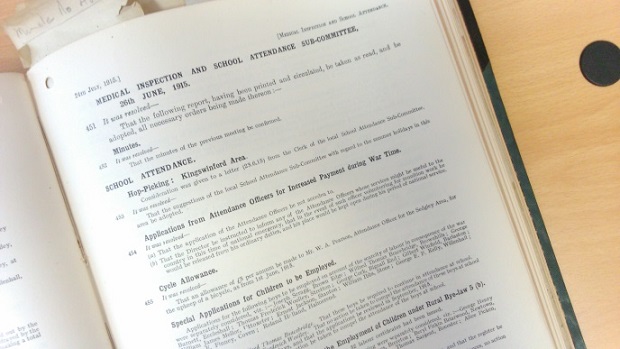
Mid-Staffordshire Appeals Project – Denise Peel
Denise Peel is a volunteer for Staffordshire Records Office, currently cataloguing the Staffordshire County Council Minute Books as part of the WW1 Mid-Staffordshire Appeals 1916-1918 project. Here she shares her thoughts on the project so far, and some of the interesting features she has unearthed. Through the development of this project, not only have we learnt more about those who were called to the Colours, but also the world of Staffordshire’s communities at that time, helping us to understand the stresses and strains on work and family life during ‘the Great War’.
I heard about the Appeal Tribunal records on the radio and having seen some extracts from Conscientious Objector’s court hearings at Ripon, I thought it would be interesting to get involved in some way. Having attended a meeting where we were told more about these records, I was keen to learn more. I was therefore extremely disappointed to be asked to work through Staffordshire County Council Education Committee records, thinking this would turn out to be as interesting as the proverbial drying paint. How wrong I was! I was told to record anything that interested me and having been given free rein to look at anything, I have looked at minutes referring educational standards, Industrial Schools (the forerunners of Remand Homes or Youth Offender Institutions), prizes awarded for outstanding schoolwork and the social impact of war.
Reading the minutes can be quite tantalising in that subjects are only referred to obliquely; the relevant correspondence or reports are not included in the records. For example, why was a school told that while a practice wasn’t illegal, they were to stop it immediately? What were they doing?
It seems that if you were at an Industrial School (Werrington (Boys) Industrial School and Lichfield (Girls) Industrial School were the ones mentioned in the records) you got a better deal than if you had not offended society in some way, and attended a Council School while living at home. Council School children were allowed to leave school at 14, once a Labour Certificate was issued. The young adult then had to find employment and make their own way in the world. The young Offender, having been taught a trade (farm work, farrier, basic engineering for the boys, running a household, fine embroidery and household accounting for the girls) is found a situation on leaving the institution and sent off with a small sum of money and a set of clothing. The Industrial Schools also kept in touch with their ex- pupils, offering a place to stay or looking after their welfare.
I was impressed at the number of evening classes run in various subjects (beekeeping, dairy skills, butter making, woodwork, poultry keeping and mining – all useful skills) and the number of Scholarships and Prizes awarded.
When it became clear that the War would actually happen, the Education Committee met to discuss how those employees who went into active service would be treated. It was decided that their forces pay would be topped up until it was the same amount as their earnings with Staffordshire County Council and where possible, there would be employment for them on their return. Later minutes seemed to suggest that this would only be the case for those who were officers and the pay would not be paid while the employee was at Officer training College. I would like to know what happened in the case of other workers (caretakers, Attendance Officers, etc.).
I learned about a woman doctor who left her employment as a School Medical Officer to serve as a volunteer in the British Field Hospital for Belgium. Sadly, she returned 3 months later in December 1914. I wondered why she had returned so soon; she was obviously very keen to go as she was a volunteer, not a conscript and had offered to pay the wages of the doctor who would take over her duties out of her own pocket. I would love to be able to research this further.
We still have a couple of places open for volunteers to work on the project! If you would like to get involved please contact Project Officer, Rachael Cooksey ([email protected]) for more information.



